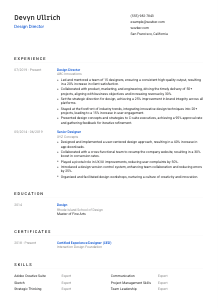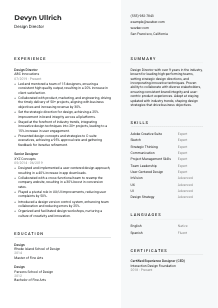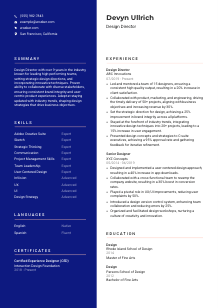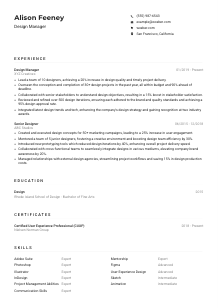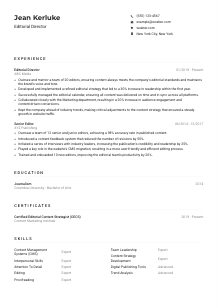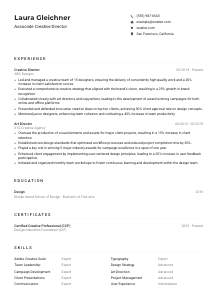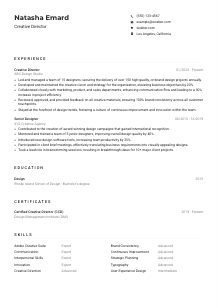Design Director Resume Example
Directing design, but feeling lost in your resume layout? Delve into this Design Director resume example, created with Wozber free resume builder. Learn how to flawlessly present your creative leadership to match job requirements, positioning your career at the pinnacle of stylish success!

How to write a Design Director Resume?
Hey there, aspiring Design Director! Ready to paint your career canvas with a resume that not only stands out but perfectly aligns with your dream role? Great resumes are the backbone of successful job hunts, and yours is about to be sculpted into a masterpiece.
With Wozber's free resume builder at your side, including ATS-compliant features like an ATS-friendly resume template and an ATS resume scanner, you're already on the path to creating an attention-commanding resume. Let's dive into the art of tailoring your resume for the Design Director position, transforming it into a reflection of your unique talents and visions.
Personal Details
In the design world, first impressions are everything. Your Personal Details section is no exception. It's the initial handshake with hiring managers, setting the stage for a memorable introduction. Tailor this part thoughtfully to mirror not just your professionalism, but the essence of what makes you the ideal candidate for the Design Director role.
1. Brand Yourself With Your Name
Think of your name as the logo of your personal brand. It should pop! Employ a legible, stylish font and size it a touch larger than the rest of the text to ensure it captures attention at first glance.
2. Position Yourself With Precision
Directly beneath your name, align yourself with the role by including the job title you're applying for, in this case, 'Design Director'. This strategic placement signals to ATS and hiring managers alike that you're not just any candidate; you're *the* candidate.
3. Essential Contact Details
Your contact information is your call-to-action. Make certain it includes a phone number that's always within reach, and an email address that balances professionalism with personality. Remember, firstname.lastname@email.com never fails to impress.
4. Geographical Alignment
Location, location, location! The job demands a Design Director based in San Francisco, California. Highlighting your San Francisco residency upfront satisfies one of the key logistical checkboxes for potential employers, ensuring there are no obstacles to your immediate start.
5. Digital Footprint
In today's digital age, a clean, professional online presence is a must, especially for a Design Director. If you have a LinkedIn profile or a portfolio website showcasing your work, include it. Make sure they're polished mirrors of your resume, gleaming with your design prowess.
Takeaway
This section isn't merely a formal introduction; it's your first opportunity to design an impression that sticks. Keep it crisp, precise, and reflective of the position's requirements. With every detail, you're not just sharing information; you're telling the hiring manager, 'I belong here.'





Experience
Your work experience is where your resume really starts to take color, showcasing the depth of your creativity, leadership, and achievements. For the Design Director role, it's essential to paint a picture of not just what you've done, but how your unique contributions have propelled past teams and projects to success.
- Led and mentored a team of 15 designers, ensuring a consistent high‑quality output, resulting in a 20% increase in client satisfaction.
- Collaborated with product, marketing, and engineering, driving the timely delivery of 50+ projects, aligning with business objectives and increasing revenue by 30%.
- Set the strategic direction for design, achieving a 25% improvement in brand integrity across all platforms.
- Stayed at the forefront of industry trends, integrating innovative design techniques into 20+ projects, leading to a 15% increase in user engagement.
- Presented design concepts and strategies to C‑suite executives, achieving a 95% approval rate and gathering feedback for iterative refinement.
- Designed and implemented a user‑centered design approach, resulting in a 40% increase in app downloads.
- Collaborated with a cross‑functional team to revamp the company website, resulting in a 30% boost in conversion rates.
- Played a pivotal role in UX/UI improvements, reducing user complaints by 50%.
- Introduced a design version control system, enhancing team collaboration and reducing errors by 25%.
- Organized and facilitated design workshops, nurturing a culture of creativity and innovation.
1. Dissect the Job Description
With brush in hand, carefully highlight the aspects of your background that best align with the job description. For a Design Director, this means leadership, collaboration, and strategic direction in design projects.
2. Outline Your Masterpieces
Structure your experience in a clear, chronological order, putting your most recent (and relevant) role at the top. For each position, include your title, company name, and dates of employment. This not only shows where you've been but also the path of your professional evolution.
3. Detail Your Creative Impact
For each role, dive deeply into your responsibilities and achievements. Did you lead a team to a significant design breakthrough? Increase user engagement through innovative design strategies? Quantify these successes to offer concrete proof of your capabilities.
4. Numerical Narratives
Numbers draw the eye and quantify your impact. A '25% improvement in brand integrity' or a '30% revenue increase' are powerful indicators of your capacity to drive results. These metrics are your resume's color palette; use them to bring your story to life.
5. Relevant Revelations
Keep the hiring manager's gaze fixed squarely on what's most relevant to a Design Director. Extraneous details may dilute your narrative. If it doesn't add to their understanding of you as a top-tier candidate for this specific role, it may be better left in the drafting room.
Takeaway
Your Experience section is a gallery of your professional journey. It should evoke a sense of your style, your leadership, and how you've left your mark on the roles you've held. Approach this section as your portfolio - a testament to your creativity, your impact, and your readiness to assume the mantle of Design Director.
Education
While the Experience section is the main exhibit of your resume gallery, the Education section is the foundation upon which your artistic and leadership abilities are built. For a Design Director, it demonstrates your formal preparation and commitment to your craft.
1. Highlight the Required Degrees
The job calls for a 'Bachelor's degree in Design, Fine Arts, or related field; Master's degree preferred.' Your resume should accordingly showcase your highest level of relevant education, placing a spotlight on your formal training in the design domain.
2. Layout with Clarity
Your educational credentials should be laid out clearly and succinctly. Start with your most recent degree, including the type of degree, your major, the institution's name, and your graduation year. This straightforward structure ensures ease of readability and immediate comprehension.
3. Tailor for the Role
For a Design Director, having a 'Master of Fine Arts in Design' speaks volumes about your depth of knowledge and specialization. If your education aligns perfectly with the role's requirements, make sure it's front and center, unmistakably aligning you with the job's demands.
4. Coursework and Projects
Though not always necessary for more senior roles, highlighting specific courses or projects can be beneficial, especially if they directly relate to the job at hand. For instance, a Thesis on 'The Impact of User-Centered Design on Brand Loyalty' could be particularly compelling.
5. Other Academic Accolades
Have you received any honors or been part of relevant design organizations during your academic career? While senior roles may focus less on these details, they can still add depth to your education story, indicating an early commitment to excellence and leadership in your field.
Takeaway
Your Education section stands as a testament to your preparedness and foundation in the design field. It needs to resonate with the employer's needs, underscoring your fit for the role of Design Director. Let it reflect not just where you've studied, but how your educational journey has equipped you for leadership in the design universe.
Certificates
As a Design Director, continuous learning and updating your skills are keys to staying on the cutting edge. While your experience and education carry the main melody of your professional symphony, certificates are the high notes that can truly set you apart.
1. Identify the Role's Essentials
Though the job listing may not specify them, certain certifications can underscore your commitment to excellence. Staying abreast of the latest in design thinking, UX/UI trends, and leadership methodologies is always in vogue.
2. Select with Strategy
Quality beats quantity every time. Choose to list certifications that amplify your qualifications for the Design Director role, such as 'Certified Experience Designer (CED)' or 'Agile Leadership for Creatives'. These should directly enhance the narrative of your expertise and leadership in design.
3. Date Disclosure
For certifications, currency is king. Make sure to note the acquisition or expiration dates, as this demonstrates your dedication to staying current and relevant in a rapidly evolving field.
4. Never Stop Learning
The design and tech landscapes are perpetually shifting. Regularly seeking out new certifications not only broadens your skill set but exemplifies a mindset of continuous improvement—crucial for a leadership role in design.
Takeaway
Think of your Certificates section as the polish on your professional profile. It's where you showcase your initiative to go above and beyond, highlighting your commitment to excellence and continuous learning. Relevant certifications can sparkle, catching the eye of hiring managers and further distinguishing you as the ideal Design Director.
Skills
In the design world, having a robust skill set is like having the right tools in your art box. For a Design Director, it's essential to demonstrate not just your artistic prowess, but your strategic thinking, leadership, and ability to drive successful projects. Let's sketch out how to perfect this section with Wozber's ATS optimization tools.
1. Analyze the Job Listing
First up, decoding the job description is your clue to understanding which skills are non-negotiable. Look for keywords such as 'proficiency with Adobe Creative Suite', 'strategic thinking', and 'project management skills.'
2. Match and Map Your Skills
With your list of crucial skills in hand, it's time to match them with your own. Remember to include both hard skills like 'Adobe Creative Suite' and soft skills such as 'Team Leadership' and 'Communication'. This showcases not only your technical expertise but your ability to lead and inspire.
3. Organize and Prioritize
Now that you've got your arsenal ready, organize your skills in a way that captures immediate attention. Start with the skills most relevant to the Design Director role. A blend of tech-savviness and leadership acumen here will speak volumes.
Takeaway
Your Skills section is a showcase of your professional toolkit. Each skill you list not only adds a brushstroke to the portrait of you as the ideal Design Director but also is a testament to your readiness to lead in the design field. Be thoughtful, be strategic, and let your skill set shine brightly, backed by Wozber's ATS-friendly resume format for optimal visibility.
Languages
Being multilingual in today's global design landscape is akin to having multiple color palettes at your disposal—it opens up a world of creative and communicative possibilities. Here's how to effectively highlight your linguistic prowess in alignment with what the Design Director role might entail.
1. Revisit the Job Specs
For this role, 'fluency in English' is specified as a requirement. This is your baseline. Ensure English tops your list of languages, marked as 'Native' or 'Fluent', echoing the job's demands.
2. Showcase Your Language Portfolio
Following English, list other languages you're proficient in. This adds depth to your profile, presenting you as a versatile communicator able to navigate international and multicultural design spaces.
3. Clarity in Proficiency
For each language, clearly define your level of proficiency. Use terms like 'Native', 'Fluent', 'Intermediate', and 'Basic' to offer a transparent snapshot of your linguistic capabilities.
4. The Global Audience Appeal
While the primary focus might be on fluency in English, don't underestimate the appeal of additional languages. They signal your ability to engage with diverse teams and clients, an invaluable trait for a Design Director in a globally connected world.
5. Comprehend the Role's Scope
Understanding the scope of the Design Director role in relation to international and multicultural contexts can guide you in positioning your language skills as an asset. In a global market, your ability to communicate across cultures is a distinct advantage.
Takeaway
Your proficiency in multiple languages paints you as a global Design Director, ready to lead and inspire in an increasingly interconnected world. Highlighting this aspect of your skill set not only emphasizes your adaptability but also your potential to bring diverse teams together. Your languages are more than just words; they're an invaluable part of the rich tapestry of your professional identity.
Summary
The Summary section of your resume is your moment under the spotlight—it's your chance to convey your narrative concisely and compellingly. This is where you weave your experiences, skills, and vision into a narrative that captures the essence of why you are the perfect fit for the Design Director position.
1. Absorb the Job's Core
Your first step is to distill the essence of the Design Director role from the job description. Understand the mix of creativity, leadership, and innovation that's expected of you.
2. Craft a Compelling Introduction
Begin with a succinct statement that encapsulates your professional identity. 'Design Director with over 9 years in the industry' sets the stage, but don't stop there. Add color by mentioning your strengths in leading high-performing teams and driving strategic innovation.
3. Highlight Matching Expertise
Dip into your palette of experiences to highlight achievements that resonate with the job's requirements. Speak to your strengths in 'setting strategic design directions' and 'incorporating innovative techniques', directly mirroring the stated needs of the role.
4. Concision is Key
While it might be tempting to detail every success, remember that the summary is merely the entryway to the gallery of your career. Aim for 3-5 lines that encapsulate your match for the Design Director role, inviting the reader to explore the breadth of your resume.
Takeaway
Your Summary is the headline of your professional story. Craft it to immediately resonate with the essence of the Design Director role, using it as a magnet to draw hiring managers into the detailed exhibit of your career. Remember, your summary is the first brushstroke of what promises to be a compelling portrait of your potential. Let it speak volumes in just a few, carefully chosen words.
Embarking On Your Design Director Journey
Congratulations on refining your resume into a beacon for your Design Director aspirations. With Wozber's free resume builder, including its ATS-friendly resume templates and ATS resume scanner, you've crafted a document that's not just ATS-optimized but is a vibrant reflection of your unique professional narrative. As you send it out into the world, remember: every line you've penned is a testament to your creativity, leadership, and vision. You're not just seeking a role; you're offering a lens through which to view the future of design.
Here's to making that future yours. Embark confidently—you've got this!

- Bachelor's degree in Design, Fine Arts, or related field;
- Master's degree preferred.
- Minimum of 8 years of experience in a design role with at least 3 years in a leadership position.
- Proficiency with design software such as Adobe Creative Suite, Sketch, and InVision.
- Strong strategic thinking, communication, and project management skills.
- Experience with user-centered design methodologies and a deep understanding of UX/UI principles.
- The position demands fluency in English.
- Must be located in San Francisco, California.
- Lead and mentor a team of designers, ensuring high-quality output and professional growth.
- Collaborate with cross-functional teams including product, marketing, and engineering, to deliver on business objectives.
- Set the strategic direction for design, ensuring visual consistency and brand integrity across all platforms.
- Stay updated with industry trends and best practices, incorporating innovative design techniques where applicable.
- Present design concepts and strategies to executive stakeholders, gathering and incorporating feedback for refinement.





